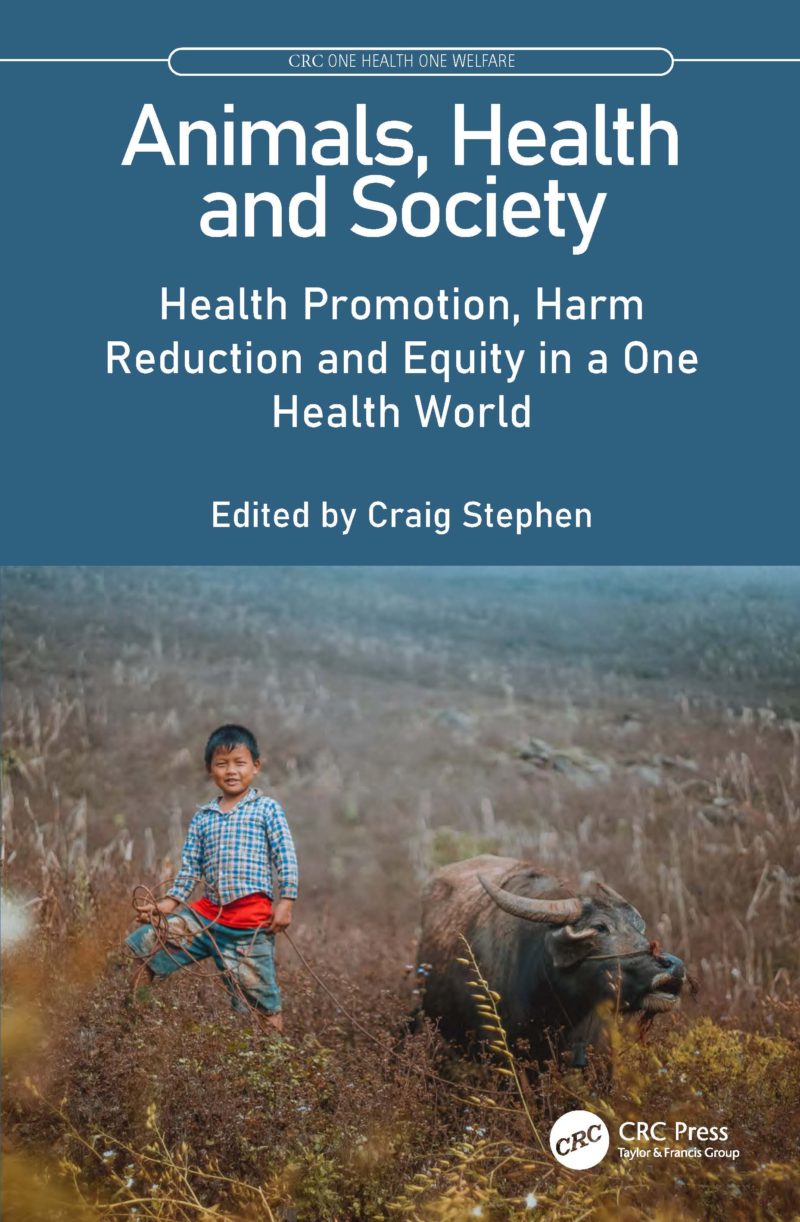‘Animals, Health and Society: Health Promotion, Harm Reduction and Health Equity in a One Health World’ is feminist narrative therapy for our dysfunctional human family, acknowledging our troubled past, but now saying: okay, we’ve survived, so where do we go from here? In this book, Craig Stephen and his colleagues grab us firmly by the shoulders, turn us around, and shift our gaze from the disheartening chaos around us, and energizing us to take on the tasks of building a more convivial multi-species future.
David Waltner-Toews BSc DVM PhD, Professor Emeritus of Population Medicine, University of Guelph
A question I’m often asked as I complete the final months of my part-time MSc in Animal Welfare is ‘So what are you going to do with that?’ The answer has changed a lot since I started the course in 2017 with visions of founding my own animal sanctuary. While I’ve not totally given up on that dream, for now I’ve realised that the knowledge I’ve gained and contacts I’ve made on my course can marry up very nicely with my existing job in academic publishing. As an acquisitions editor for Life Science and Veterinary books, I’m in the privileged position of being able to shape my company’s portfolios: in this instance, to guide our publishing in a more welfare-based direction. So over the last two years I’ve been signing more books on understanding animal behaviour, on implementing the ‘3Rs’ in laboratory animal science and, most excitingly, I’ve launched a new book series called ‘CRC One Health One Welfare’. This series recognises the interconnections between human well being, animal health/welfare and the environment, putting emphasis on the importance of interdisciplinary collaboration and solutions. It spans a diverse range of disciplines from veterinary medicine and zoology to public health and conservation. I’ve reached out to authors and editors from the UK, US, Australia, Europe and across the globe, ensuring the readership will be international. The books target academic researchers, professionals – from veterinarians and ‘on-the-ground’ practitioners to policy makers – and graduate level students.
Publishing is a notoriously slow business so it’s only now that I’m able to announce the initial titles in this series, publishing this winter. The first, Learning from Disease in Pets, encourages veterinarians to build on and disseminate findings discovered when treating naturally-occurring illness in pets, thus reducing the need to induce disease in healthy laboratory animals. The second, Animals, Health and Society, is going to be a game changer. Edited by Canadian veterinarian and epidemiologist Craig Stephen (who has also authored many of the chapters), the book re-frames the damaging narrative of people, animals and nature as being ‘risks’ to each other to an alternative story where we think about health as a “shared capacity”. Stephen’s new narrative promotes the positive contributions made to health across species and generations, taking the reader on a tour of the situations wherein we can all, whatever our job, motivate action. A series of fascinating case studies demonstrate that the principles and practices presented are feasible, empowering people to make choices that benefit the health of animals, societies and ecosystems. As Stephen writes in Chapter 1:
Ours is an animal society. Most of the world’s poor still depend on subsistence agriculture and fisheries to meet their daily nutritional and income needs. Animal protein fuels the diets of the growing middle class and wealthy. Animals play a major role in aboriginal cultures, income in rural and remote communities, our mental health and in scientific innovations. Conversely, there are few animals that can escape mankind’s influence. Our dietary preferences, natural resource management, and attitudes to animal welfare and rights greatly influence how animals can access the resources they need to be healthy. Anthropogenic factors weigh heavily in the list of major threats to fish and wildlife while the decisions we make for housing and husbandry of our pets and agricultural animals determine their fate. Which species we protect is dictated by sociopolitical considerations, resource limitations and social values.
This is perhaps one of the most succinct summaries of human and animal co-dependencies that I’ve read. I also recommend Margot Parkes’ Chapter 5 ‘Working together for WHOLE systems’ for its constructive calls for change, with concrete steps for how this can be actioned. Colin Robertson’s Chapter 8 on the spatial perspective and Colleen Duncan and Tricia Fryon’s Chaper 15 on Conserving Nature are fascinating, while Stephen’s Chapter 9 ‘Helping people make healthy decisions for themselves, animals, and nature’ is a topic that anybody who has tried to enact human behaviour change will find highly relevant Finally, Joy Wade’s Chapter 19 on the neglect of less ‘charismatic’ species in conservation messaging is a must-read for anybody interested in conservation ethics. Overall, readers will come away from this book feeling positive and brimming with ideas as to how to take useful action. Which is exactly the intention of this book: ‘bridging knowledge to doing’.
David Waltner-Toews writes in his Foreword that this is “the perfect book for this moment in time”. We are living at a rare moment in history, where:
We have an opportunity to collectively and collaboratively reframe destruction into creative destruction and reorganization. Where some see only ends, these authors would have us consider beginnings.
You can pre-order the book here now and lecturers can order Inspection Copies via the webpage too. If you’re interested in reviewing the book for a journal or other publication, do drop me a line at Alice.Oven@tandf.co.uk. Finally, if you have an idea for a new book in the CRC One Health One Welfare series, I’d be delighted to talk it through, so don’t hesitate to get in touch.
